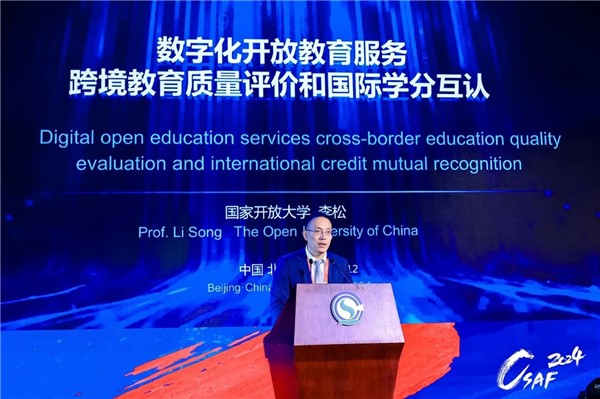 On 12 April, the opening event of the 2024 China International Education Exhibition Tour (CIEET) and the China Study Abroad Forum (CSAF) was held in Beijing.
On 12 April, the opening event of the 2024 China International Education Exhibition Tour (CIEET) and the China Study Abroad Forum (CSAF) was held in Beijing.
Li Song, a member of the Party Committee and vice president of the Open University of China (OUC), was invited to attend the forum and share insights on a special theme.

The event was hosted by the Chinese Service Centre for Scholarly Exchange, with the theme "Embracing Challenges, Creating a Shared Future: For a New Landscape of Study Abroad ". It focused on topics such as the trends and patterns of international talent cultivation, cross-border education quality evaluation, and the mutual recognition of academic qualifications. Discussions also covered cooperation, exchanges, and system innovation in higher education within the context of digitalisation and internationalisation. The event proactively engaged in in-depth discussions on the mission and responsibilities associated with studying abroad.
Li Song delivered a speech titled "Digital Open Education Services: Cross-Border Education Quality Evaluation and International Credit Mutual Recognition." He stated that the OUC is a new type of higher education institution committed to promoting lifelong learning. It has accumulated experience in advancing educational digitalisation, credit bank construction, credit accreditation, and international education exchanges. This experience provides a solid foundation for future services in cross-border education quality evaluation and international credit mutual recognition. He emphasised that mutual recognition of credits requires a solid guarantee of educational and teaching quality. The OUC has consistently focused on building a quality brand and fostering a culture of quality, which lays a strong foundation for establishing a credit certification mechanism. At the same time, it is essential to fully leverage the role of the credit bank as a cornerstone, continuing to enhance the development of the credit bank and optimise the credit certification mechanism. He mentioned that in the future, the OUC should transform itself into a significant platform for international exchanges by establishing a qualifications framework and facilitating the mutual recognition of course credits. The OUC should also continue to amass high-quality global educational resources, creating a high-level, systematic, multi-type, and internationalised digital learning course bank. Additionally, it should establish a nationwide digital archive for lifelong learning and construct mechanisms for domestic and international credit accreditation, accumulation, and transfer in the digital context. Through accrediting prior learning outcomes and establishing rules for credit transfer, a learning mode of 'flexible combination, alternative and parallel learning, and agile teaching' has been implemented. This allows for obtaining academic qualifications and degree certificates through the practice of credit accumulation, creating a new pathway for students from overseas to study in China.
Government officials, experts from the domestic and international education sectors, representatives from foreign and Chinese universities, delegates from "going global" enterprises, and returnees attended the opening event. They gathered to discuss and build consensus on adhering to and implementing national education policies, enhancing China's involvement in international education governance, and contributing to global educational development.
Reproduced by the OUC News Network from Chinese Service Centre for Scholarly Exchange